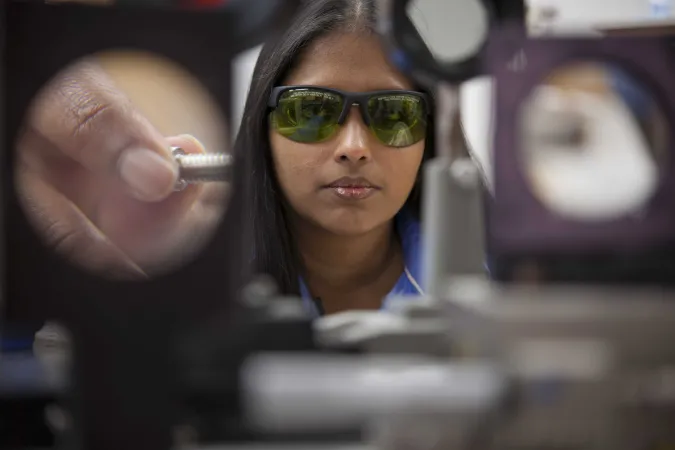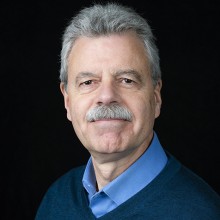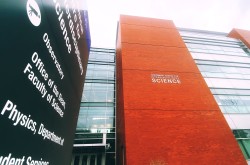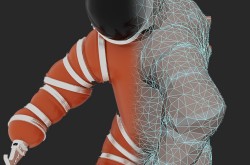Celebrating Women’s History Month in Canada with Dr. Shohini Ghose, Quantum Physicist

October is Women’s History Month in Canada. It is a time to celebrate the women and girls from our past, and our present who are contributing to a better, more inclusive Canada. The theme of Women’s History Month this year is “Through Her Lens: Celebrating the Diversity of Women.” There are many accomplished women in Canada who deserve to be celebrated this month. One such prominent Canadian woman is Shohini Ghose, currently Professor of Physics and Computer Science at Wilfrid Laurier University, in Waterloo, Ontario. Dr. Ghose is also a TED Senior Fellow, NSERC Chair for Women in Science & Engineering, and Director, Research & Programs, Laurier Centre for Women in Science. And she has found the time to author two books, the latest one titled Her Space, Her Time: How Trailblazing Women Scientists Decoded the Hidden Universe was published this fall.
The Ingenium Channel’s editor recently spoke one-on-one with Dr. Ghose.
Ingenium: Thank you for taking a few minutes to speak with us for the benefit of our Channel readers – especially our young readers – who hopefully will be inspired by learning about what makes you tick, about your background, and what the future holds for you.
Shohini Ghose: You’re welcome. I love learning and I hope our discussion will inspire girls to pursue their education in their field of interest, just like I did.
Ingenium: Shohini, you say that from an early age you wanted to understand how the world worked, and that this curiosity and your search for answers led you to want to be a scientist. Where do you think this natural curiosity came from? Your parents? Your teachers? Other influencers when you were growing up?
SG: I think we are born with a natural curiosity to discover the world around us, perhaps driven by evolutionary survival instincts. Just look at how babies explore and learn about the world around them through their senses such as touch, taste, and smell. As we grow older, many of us forget to be curious. Or maybe we become too busy and the steep learning curve of our youth starts to flatten out. In my case, I fell in love with books and they satisfied a lot of my curiosity and also showed me how much there is to discover in the universe. I was also very lucky to have parents and teachers who encouraged me to be curious and to learn.
Ingenium: You sound like a very determined person as you pursued your goals. But we all experience failures. Was there a failure – or failures – in your life that in fact helped you to succeed?
SG: Oh, yes! In any research career, you spend your days searching often fruitlessly for ways to solve the problem you are exploring and if you are lucky you have perhaps a week of success for every six months of trying and failing! It’s like trying to find a path through an unexplored forest – you have mostly failed attempts before you find the way. However, all new physics discoveries happen when the old models fail. For example, when observations showed the Earth was not the centre of the universe, we realized our place in the universe. So, knowing that failure actually plays a huge role in scientific progress helps me to keep moving forward.
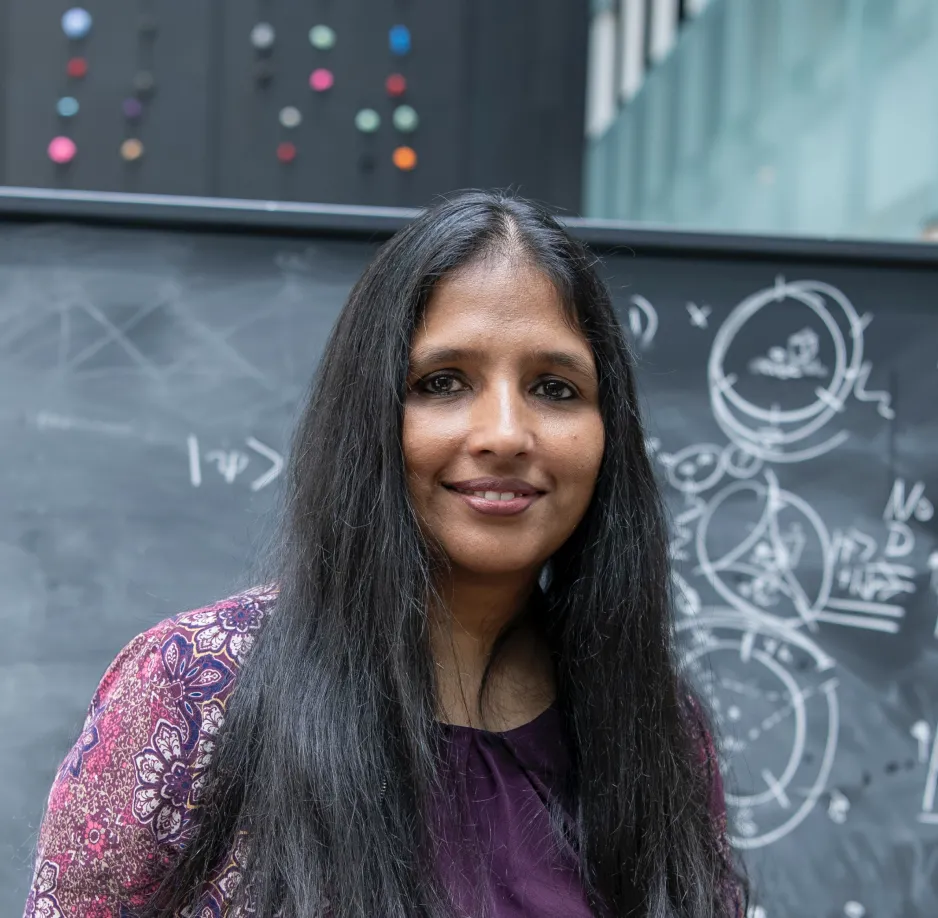
Dr. Shohini Ghose working with researchers at the Perimeter Institute for Theoretical Physics, Waterloo, Ontario.
Ingenium: Can you think of a couple concrete examples of when or where you personally failed and what you learned from your experiences?
SG: I failed my first quantum physics quiz in graduate school. That was a rude awakening and made me realize that there is no short cut; if I wanted to aim high, I must work for it. So I put in the effort and by the end of the course I had worked through every page of my two-volume quantum textbook. As it turned out, making all that effort to study and learn from the textbook became the foundation of my passion for quantum physics!
Another failure taught me lessons and skills about working successfully with groups of people. As Director of the Laurier Centre for Women in Science, I was supervising a large survey of researchers in Canada, but the project stalled due to poor time management and communication on my part. So I had to take a step back, rethink the project and better understand the needs and challenges of the team – not just my own as leader – before restarting the project. I am always learning how to better communicate and understand the many perspectives of diverse teams and how to enable everyone to play to their individual strengths, and not just my expectations of them.
Ingenium: Those are great examples. Learning from failure is very valuable because failure also teaches us what doesn’t work. Shohini, how do you define success?
SG: I don’t quite know how to answer because I don’t really sit down and ask myself that question. When I think about the nature of my research work, I guess success is about always exploring. What I mean is that in my research I am constantly asking questions about how the laws of quantum physics work. And so success is when I can find a way to answer those questions, and then build on that success by using the answers and knowledge to make a better future.

Dr. Shohini Ghose teaching students at Wilfrid Laurier University, Waterloo, Ontario.
Ingenium: That’s an uplifting and inspiring answer. Do you have any success habits and, if so, what are they? Did you derive them from personal trial and error, or from emulating someone you admire, or some of each?
SG: I never explicitly made a list, so I suppose I learned what works for me through experience. For example, I have learned time management is critical. So I am very careful about scheduling my day efficiently. Time, unlike money, cannot be replaced. I know that’s a short answer to your question, but time marches in only one direction – forward. So my advice to young people today is not to waste it.
Ingenium: Who were your role models growing up? Do you have any today as an adult?
SG: As a kid, I was inspired by Rakesh Sharma who in 1984 was the first Indian astronaut to go to space. In more recent times, I have to say I am a big fan of Serena Williams, the professional tennis player who retired in 2022 after playing at a very high level through most of her 27-year professional career. These two people excelled in two very different fields through hard work, consistency, and perseverance.
Ingenium: If you could go back in time as the Dr. Shohini Ghose of 2023, and speak to a much younger Shohini, what specific things would you talk to her about? What advice would you have for your younger self?
SG: Spend more time with mom and dad if you can. Don’t listen to that voice in your head questioning whether you are good enough to be whatever you want to be. Talk to more people who you have nothing in common with. Don’t bother to record all those music cassette tapes – everything will be magically available at your fingertips in the future.
Ingenium: What do you still want to achieve? What does the future hold for Dr. Ghose?
SG: I want to continue exploring the laws of the universe. I would love to ultimately shut down the Centre for Women in Science that I founded, which will only happen once we achieve equity, diversity, and inclusion in science. I’m also excited about helping to build a national quantum ecosystem in Canada that all Canadians can benefit from.
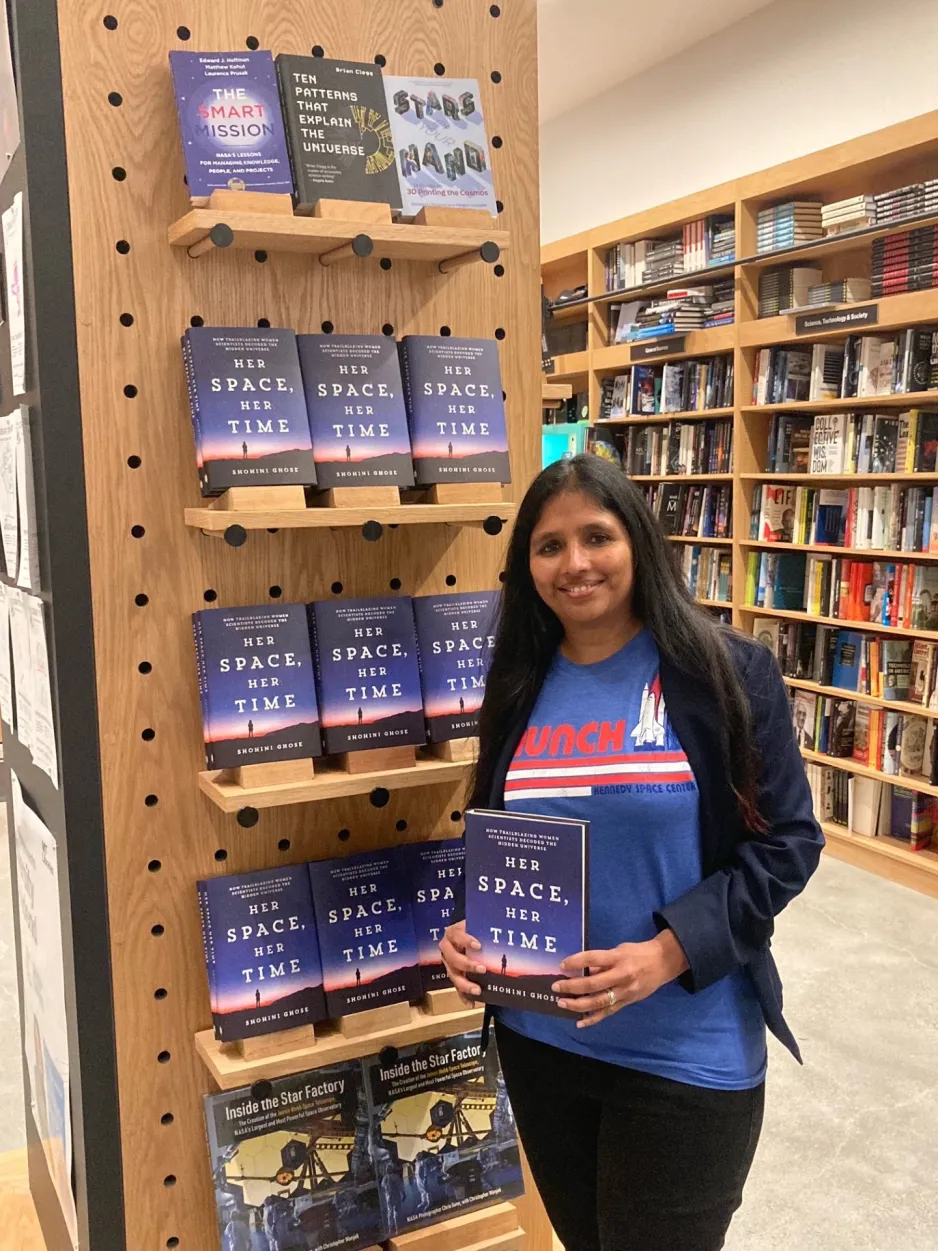
Dr. Shohini Ghose with her new book Her Space, Her Time, published in October, 2023, about women scientists who transformed physics and astronomy.
Ingenium: We here at Ingenium and I am sure along with our readers wish your success in all your activities and projects. Speaking of projects, you recently wrote another book titled Her Space, Her Time: How Trailblazing Women Scientists Decoded the Hidden Universe. What prompted you to write about this topic?
SG: I wanted to tell the hidden story of physics. Every major discovery in physics – from the big bang, to particle physics, to radioactivity to dark matter, space exploration – has involved critical contributions from women who have remained largely unrecognized. I wanted to celebrate these women’s amazing journeys of scientific discovery, while also telling their personal stories of overcoming challenges as women in a field dominated by men, and emerging as leaders both in science and in society. There is a lot of inspiration and a lot to be learned from their stories.
Ingenium: And from you, too, Shohini! Thank you for giving our readers insight through your lens into your work, and into who you are as an accomplished woman and scientist.
Enjoying the Ingenium Channel? Help us improve your experience with a short survey!


